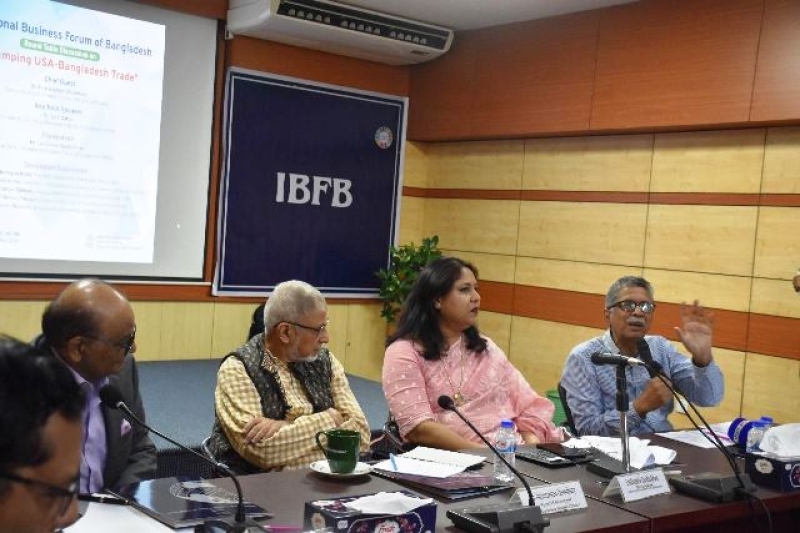- India Sees 9% Drop in Foreign Tourists as Bangladesh Visits Plunge |
- Dhaka Urges Restraint in Pakistan-Afghan War |
- Guterres Urges Action on Safe Migration Pact |
- OpenAI Raises $110B in Amazon-Led Funding |
- Puppet show enchants Children as Boi Mela comes alive on day 2 |
BD needs strong lobby with USA in changed situation

Anisuzzaman Chowdhury, special assistant for Finance Ministry while addressing a roundtable in the city, organised by International Business Forum of Bangladesh on Saturday
Dhaka, May 17 – Bangladesh needs to create a strong lobby with the USA to cope up with the changed situation in the trade, said the special assistant to the finance ministry on Saturday.
“The USA will administer the world trade so we have to create strong lobby with US and we have to bring out a new traction to cope up with the changed situation”, said Anisuzzaman Chowdhury, special assistant for Finance Ministry while addressing a roundtable in the city, organised by International Business Forum of Bangladesh (IBFB).
IBFB President Lutfunnisa Saudia Khan chaired the discussion titled “Revamping USA-Bangladesh Trade” while it was addressed by Mustafizur Rahman, distinguished fellow, Centre for Policy Dialogue (CPD), Syed Ershad Ahmed, president, American Chamber of Commerce in Bangladesh, and Mahfuz Kabir, director, Research, Bangladesh International institute of Strategy Studies (BIISS).
Zaidi Sattar, chairman & CEO, Policy Research Institute of Bangladesh (PRI) presented a keynote paper on the occasion.
Addressing the session, Anisuzzaman stressed the need to have policy coordination, policy independence and to find out effective ways of negotiation to tackle the challenges in world trade.
“International circumstances are now different, we have to build self-confidence and ultimately we have to bring diversification in our economy. The government will form a specialized trade negotiation body ahead of graduation”, he added.
Noted economist Zaidi, in his keynote, mentioned as baseline tariff currently there is a flat 10% across all imports which is shocking.
He said the variable tariff rates applied to top 60 trading partners and higher tariffs imposed on nations considered "Worst Trade Offenders". US Tariff on China 30% & China Tariff on US is 10% while 25% for Canada and Mexico.
Suggesting to go for negotiation strategy, he said engaging U.S. to reduce tariffs on key U.S. export items like agri-products, machinery, autos, he said focusing on low-revenue items (cotton, scrap metal tariffs already near-zero), MFN basis and lower own tariffs on non-RMG items (e.g. footwear) to reduce anti-export bias
He mentioned that the trade diversion could benefit Bangladesh due to China’s tariff burden (54%) while there will be risk of global GDP shrinking by 1%, trade by 3%; Asia particularly vulnerable
In terms of RMG sector actions, Zaidi suggested collaborating with buyers to share increased costs, mentioning that limited bargaining power makes price adjustment critical.
Citing that China and the US are the two largest economies in the world, he said that the US, at $26 Tr, commands a quarter of world GDP while China is next, with $16 Tr. The two make up over 40% of world GDP. The two are also the largest trading economies in the world; 33% of world trade; China the largest exporter, US the largest importer.
CPD’s Mustafizur suggested strengthening negotiating capacity, mentioning that we can sign Free Trade Agreement (FTA) or Preferential Trade Agreement (PTA) with the US but it will not be so easy.
“US Tariff is called reciprocal but in fact it is irrational and one-sided. We need to bring the tariff issue to the TICFA platform but we are not still ready for that”, he added.
IBFB President Lutfunnisa said the USA is a major trade partner of Bangladesh, especially as a leading market for our exports mainly in the Ready Made Garments (RMG) sector.
She said the suspension of GSP benefits and the rise of protectionist policies in recent years have impacted our competitiveness in key sectors like garments, leather and light manufacturing-hurting export performance, slowing job growth and affecting investor sentiment.
BIISS Research Director Mahfuz said TICFA is the proper platform to discuss the issue and begin the negotiating process. - UNB

